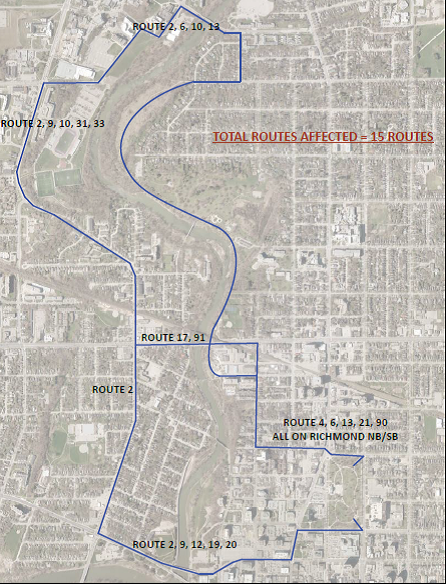Staff Report #6
April, 24, 2019
To All Commissioners
Re: 2019 Special Events – Transit Service Impacts
Recommendation
The report be NOTED and FILED.
Background
Regularly there are special events that take place in the city such as road races, parades, marches, etc. which have an impact on transit service -a number of which have historically utilized Queens Ave for all or a portion of their routes. With the removal of buses off Dundas to operate on King and Queens, an alternative route for transit, specifically westbound, is not operationally feasible for events utilizing Queens Ave. Given this new alignment, London Transit administration has requested City of London and London Police Services to assess alternative routing options for special events to minimize the negative impacts on transit riders.
At the time of writing, London Transit administration has recently been made aware of two major events in 2019 that will continue to utilize Queens Ave and as a result will have a significant impact on the quality of service provided during the events.
Forest City Road Race
The Forest City Road Race is scheduled for Sunday April 28, 2019 starting at 8 am. The routing of the race will have significant impacts on transit service as runners will be running in the curb lanes along Queens Ave (starting at Clarence), Riverside to Wharncliffe Road and Wharncliffe Road to Phillip Aziz, as well as around Victoria Park including Richmond St. for the shorter runs. A portion of the Half Marathon also operates on Western University Campus. London Transit was notified on April 17 that the University Drive Bridge would be closed during the race; however campus police could flag buses across. This has the potential to result in significant schedule adherence delays as buses will not be able to cross the bridge when runners are present. At time of writing there were over 500 participants registered for the half marathon. Administration will be further assessing the potential impacts to determine if routes should be detoured around Western University during the run, noting other slowdowns on campus are also expected due to the routing of the race. Although the roads will remain open and detours of transit routes will not be required, the run will be occurring in the curb lanes resulting in buses being unable to service any westbound and northbound stops along the route, due to passengers having to cross the running path. The inability to service stops will result in these portions of the routes being inaccessible for the duration of the closure – see figure I below. The routing will have an impact on a total of 15 routes with the most significant impacts on Routes 2, 9, 19, 20 and 102.
Concerns regarding the planned routing were raised with the City of London and London Police Services last year and the understanding was that considerations would be given to a new route for 2019. Concerns were again raised when the planned routing was published in late March however, it was determined by London Police Services that the route had been established and approved and there was no opportunity to change it. London Transit will be continuing discussions with the City of London to have the routing revised for future years.
Figure I

CIBC Run for the Cure
The CIBC Run for the Cure is scheduled for October 6, 2019. The routing for the run is anticipated to impact transit service on Richmond, Queens, Riverside, Wharncliffe and Oxford, impacting 20 routes. As with the Forest City Road Race, discussions were held with the City of London and London Police Services in 2018 with regard to finding an alternative route for 2019 to minimize the impact on transit. Information that London Transit has received to date is that the routing has already been approved and there is no opportunity to make any changes.
Communication Strategy
Interruptions of this nature are extremely difficult to communicate to passengers given the buses continue to operate along the normal route, but are unable to board or alight passengers. An extensive communication strategy will be implemented to ensure that passengers and Operators are aware of the impacts, including internal postings, a social media campaign, stop level notices and website information. In addition, communication advising boarding and/or on-board passengers of inactive stops during the events is to be enhanced.
Recommended by:
Shawn Wilson, Director of Operations
Katie Burns, Director of Planning
Concurred in by:
Kelly S. Paleczny, General Manager